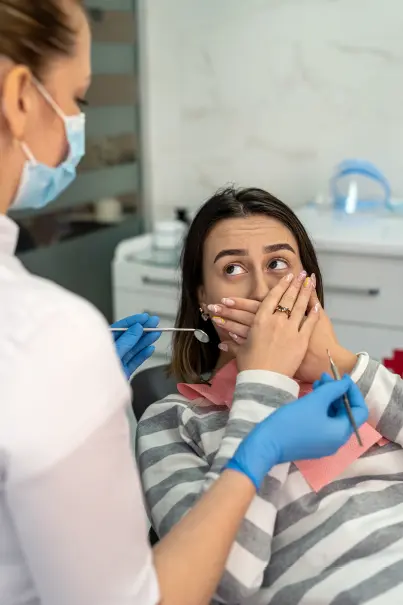Going to the dentist is a routine part of maintaining good oral health, but for some individuals, it can be a source of great anxiety and fear. Dental anxiety is a common condition that affects people of all ages, and it can prevent individuals from seeking the necessary dental care they need. However, overcoming dental anxiety is possible with the right understanding, support, and strategies. In this blog post, we will explore dental anxiety, its causes, and effective techniques to help you overcome your fear and take control of your oral health.

Understanding Dental Anxiety
Dental anxiety is a term used to describe the fear or anxiety experienced by individuals before or during a dental visit. It goes beyond the normal nervousness that people may feel before any medical appointment. Dental anxiety can range from mild uneasiness to extreme fear or phobia. It may result in people avoiding or postponing dental visits, leading to deteriorating oral health and increased potential for dental problems.
Causes of Dental Anxiety
There are numerous reasons why people experience dental anxiety. Some of the common causes include:
- Previous negative dental experiences: Traumatic or painful experiences at the dentist in the past can create lasting negative associations and heighten anxiety.
- Fear of pain: The fear of experiencing pain during a dental procedure is a significant concern for many individuals. The anticipation of discomfort can amplify anxiety levels.
- Feeling of lack of control: Lying back in the dental chair while a dentist or hygienist examines or treats your teeth can create feelings of vulnerability and lack of control, contributing to anxiety.
- Embarrassment or self-consciousness: Some people may feel self-conscious about the appearance of their teeth or the condition of their oral health. This self-consciousness can intensify anxiety about dental visits.
- Fear of judgment: Worries about being judged by dental professionals can also contribute to dental anxiety. Some individuals fear criticism or lectures about their oral hygiene habits.
Overcoming Dental Anxiety
Confronting and managing dental anxiety is crucial for maintaining good oral health. Here are some effective strategies that can help:
- Communicate with your dentist: Speak openly with your dentist about your dental anxiety. Informing them about your fears and concerns will enable them to tailor your treatment to address your specific needs. Establishing open communication with your dental team can greatly alleviate anxiety.
- Seek distractions: Engaging in distractions during dental procedures can help divert your focus away from anxiety. Listening to calming music, using noise-canceling headphones, or watching a movie or TV show can provide a soothing distraction.
- Practice relaxation techniques: Deep breathing exercises, progressive muscle relaxation, or meditation can help calm your nerves before and during dental appointments. Learning and practicing these techniques can significantly reduce anxiety levels.
- Gradual exposure: If your dental anxiety is severe, consider gradually exposing yourself to dental environments. Start with short visits, such as only scheduling a consultation or a simple cleaning, and gradually increase the complexity of the procedures as you become more comfortable.
- Sedation options: For those with severe dental anxiety, sedation dentistry can be a viable option. Talk to your dentist about using mild sedatives during your visit, which can help you
relax and reduce anxiety during the procedure.
Remember, taking control of your dental anxiety is crucial for maintaining good oral health. Overcoming your fears will allow you to receive the necessary care, prevent potential dental problems, and ultimately improve your overall well-being. Talk to your dentist or a mental health professional who specializes in dental anxiety to find the best strategies for you. With the right support and techniques, you can conquer your dental anxiety and achieve a healthier smile.




